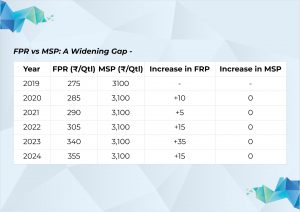The Central Government, in a cabinet decision announced today i.e. on 30th April, 2025, has increased the Fair and Remunerative Price (FRP) of sugarcane from ₹340 per quintal to ₹355 per quintal for the upcoming crushing season. While this move ensures better returns for farmers, it marks the sixth such hike since 2019, when the FRP stood at ₹275 per quintal. However, during the same period, there has been no revision in the Minimum Selling Price (MSP) of sugar, which continues to remain stagnant at ₹3,100 per quintal since 2019.
This imbalance is putting immense financial stress on sugar factories, especially cooperative and private mills, which are now grappling with unsustainable cost structures, increasing loan burdens, and difficulty in ensuring timely cane payments to farmers.

Total increase in FRP since 2019: ₹80 per quintal
Total increase in MSP of sugar: ₹0
This clearly illustrates a widening gap between the price sugar mills are mandated to pay farmers (FRP) and the price at which they are allowed to sell sugar (MSP), without any corresponding relief or pricing support.
Impact on Cost of Production –
Based on the current FRP of ₹340 per quintal, the cost of production of sugar is estimated at ₹4,166 per quintal, which is significantly higher than the prevailing MSP of ₹3,100. With the FRP now hiked to ₹355 per quintal, the cost of production will increase further, potentially crossing ₹4,300 per quintal. This deepens the financial distress faced by sugar factories, most of which are already under the burden of loans, deferred cane payments, and thin or negative profit margins.
Implications for the Sugar Sector –
Mounting Cane Arrears: The inability to match sugar sale realizations with rising FRP payouts is resulting in delayed payments to farmers.
Loan Burden: Mills are increasingly relying on working capital loans to manage cash flows, increasing financial risk and interest costs.
Delayed Crushing Seasons: Many mills may struggle to begin operations for the upcoming crushing season due to liquidity issues.
Deteriorating Financial Health: Without support mechanisms, the long-term viability of sugar factories is under serious threat.
Need for a Proportional Increase in MSP and Ethanol Prices –
To restore financial balance and ensure the sustainability of the sugar sector, the following urgent policy actions are required:
Increase in Sugar MSP:MSP should be proportionately revised to at least ₹4,200 per quintal to reflect the real cost of production based on current FRP.This would enable mills to make timely payments to farmers and service debts.
Revision of Ethanol Procurement Prices: Ethanol prices must be revised upwards in line with rising cane costs. For instance, the ethanol price from C-heavy, B-heavy molasses, sugarcane juice, and grain-based feedstocks should be recalibrated considering the increased FRP and inflationary inputs.
Integrated Pricing Policy: A Dynamic Sugar Pricing Formula should be developed, linking FRP, MSP, and ethanol prices, ensuring fair returns to farmers while maintaining the financial health of sugar mills. This would bring predictability and balance to the sector.
The Indian sugar industry is at a critical juncture. While the government’s intention to protect farmers’ income is commendable, it must also ensure the viability of sugar factories that serve as the backbone of rural economies. The lack of a proportional hike in MSP and ethanol prices, despite multiple FRP increases, is unsustainable. If corrective measures are not taken immediately, many mills will face operational paralysis in the coming season, leading to economic distress across sugar-producing states. It is imperative that the Government urgently reassesses the pricing framework and introduces rational reforms to ensure a balanced, viable, and resilient sugar ecosystem.
P.G. Medhe is the former Managing Director of Shri Chhatrapati Rajaram Sahakari Sakhar Karkhana Ltd and sugar industry analyst. He can be contacted at +91 9822329898.


















